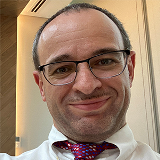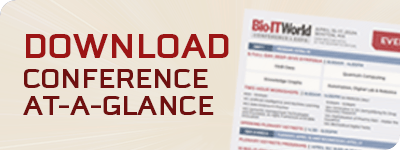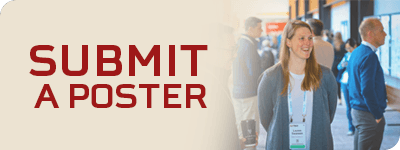AI for Drug Discovery & Development
創薬・医薬品開発向けAI
Accelerate Drug Discovery and Development with AI-Driven Efficiency
AIドリブンの効率で創薬・医薬品開発を加速
2025年4月2日〜4日 米国東部標準時(EDT)
4月2日(水)
8:00 amRegistration Open
9:00 amRecommended Pre-Conference Workshops and Symposia*
On Wednesday, April 2, 2025, Cambridge Healthtech Institute is pleased to offer five pre-conference Workshops scheduled across two time slots (9:00 am-12:00 pm and 1:15-4:15 pm) and three Symposia from 9:00 am-4:20 pm. All are designed to be instructional, interactive, and provide in-depth information on a specific topic. They allow for one-on-one interaction and provide a great way to explain more technical aspects that would otherwise not be covered during the main conference tracks that take place Thursday-Friday.
*Separate registration required. See details on the Symposia here and details on the Workshops here.
From Bytes to Breakthroughs: Generative AI Driving the Future of Life Sciences and Healthcare
 Subha Madhaven, Vice President and Head, AI/ML, Quantitative and Digital Sciences, Global Metrics and Data Management, Pfizer Inc.
Subha Madhaven, Vice President and Head, AI/ML, Quantitative and Digital Sciences, Global Metrics and Data Management, Pfizer Inc.
Generative AI has the potential to transform life sciences and deliver unprecedented insights, automation, and efficiency. But is it? This keynote panel brings together leaders from biopharma, healthcare, and emerging tech who are leveraging AI to advance drug discovery, diagnostics, and patient care. In this panel discussion, panelists will share their own case studies and real-world applications and discuss how they’ve tackled challenges-both technical and cultural. Look beyond the hype curve to see how this technology is really being used now and where the next opportunities lie.
6:10 pmWelcome Reception in the Exhibit Hall with Poster Viewing (Sponsorship Opportunity Available)
The Bio-IT Kickoff Reception is a reunion-reconnect with friends, explore cutting-edge research, and celebrate innovation! Enjoy poster presentations, networking, and vote for the Best of Show and Poster awards.

7:25 pmClose of Day
4月3日(木)
7:00 amRegistration Open
AI-POWERED PLATFORMS IN DRUG DISCOVERY: TACKLING ANTIBIOTIC RESISTANCE AND AGING THERAPEUTICS
創薬におけるAI活用のプラットフォーム:抗生剤耐性と老化治療への取り組み
Deep Learning for Antibiotic Discovery
 James J. Collins, PhD, Termeer Professor, Medical Engineering & Science, Massachusetts Institute of Technology
James J. Collins, PhD, Termeer Professor, Medical Engineering & Science, Massachusetts Institute of Technology
In this presentation, we highlight the Antibiotics-AI Project, which is a multi-disciplinary, innovative research program that is leveraging MIT's strengths in artificial intelligence, bioengineering, and the life sciences to discover and design novel classes of antibiotics. The Antibiotics-AI Project is focused on developing, integrating, and implementing deep learning models and chemogenomic screening approaches: (1) to predict novel antibiotics from expansive chemical libraries with diverse properties, (2) to design de novo novel antibiotics based on learned structural and functional properties of existing and newly discovered antibiotics, and (3) to identify, using explainable deep learning models, the chemical structures and molecular mechanisms underlying the newly discovered and/or designed antibiotics. With these deep learning approaches, we are utilizing multi-scale computation to embrace and harness the complexity of biology and chemistry, so as to discover, design, and develop new classes of antibiotics, up through preclinical studies. Our platform has been designed so that it can be utilized and applied in a rapid fashion to emerging and re-emerging bacterial pathogens, including multidrug-resistant (MDR) bacteria and extensively drug-resistant (XDR) bacteria.
9:30 amCoffee Break in the Exhibit Hall with Poster Viewing (Sponsorship Opportunity Available)
Start your morning with coffee, connections, and cutting-edge research! Enjoy poster presentations, network in the Exhibit Hall, vote for awards, and a chance at a fabulous raffle prize!
10:15 amOrganizer's Welcome Remarks
AI AND DATA INTEGRATION FOR ENHANCED R&D
AIとデータインテグレーションによるR&Dの強化
Unleashing Innovation: Harnessing AI and Data Platforms for R&D
 Bridget Behringer, Oncology E2E Business Partner Lead, R&D IT, AstraZeneca Pharmaceuticals
Bridget Behringer, Oncology E2E Business Partner Lead, R&D IT, AstraZeneca Pharmaceuticals
This presentation explores how AI and data platforms can enhance the landscape of research and development, with an ultimate goal to reduce timelines, increase probability of success, and better predict which patients are most likely to benefit from our medicines. We will describe the robust data foundation we have built and the prerequisites for deploying AI at scale.
Tech-Enhanced Preclinical Animal Logistics for Accelerated Drug Development
 Tatjana Uffelmann, Sr Scientist, Novartis BioMedical Research
Tatjana Uffelmann, Sr Scientist, Novartis BioMedical Research
This talk focuses on optimizing the logistical processes of preclinical animal studies through technology, including aspects of improved data management, tracking systems, or automation in animal handling, all aimed at speeding up the early stages of drug development.
Causal AI & Mechanostics-Increasing Probability of R&D Success from Concept to Clinic
 Simon Beaulah, Senior Vice President, Healthcare & Head of US Operations, PrecisionLife
Simon Beaulah, Senior Vice President, Healthcare & Head of US Operations, PrecisionLife
This presentation will explore how Causal AI and mechanistic patient stratification enhance R&D success in precision medicine, focusing on complex, chronic diseases. Attendees will learn how these technologies drive the discovery of personalized treatments and innovative diagnostics for unmet medical needs. We’ll discuss strategies for identifying novel targets aligned with patient biology, designing faster, more successful clinical trials, and connecting patients to effective therapies based on their disease mechanisms.
DrugX: Artificial Intelligence-Based Platform for Drug Repurposing
 Kamal Rawal, PhD, Professor and Head, Center for Computational Biology and Bioinformatics, Amity University
Kamal Rawal, PhD, Professor and Head, Center for Computational Biology and Bioinformatics, Amity University
Drug repurposing offers a promising avenue for rapidly identifying existing therapeutics for new indications, reducing the time and cost associated with traditional drug development. This study presents a robust multimodal pipeline designed to streamline the drug repurposing process. By integrating diverse computational techniques, we constructed and analyzed extensive networks from datasets encompassing 4,136 drug targets and 24,554 drug interactions. Utilizing tools such as Cell Designer, Cytoscape, and DrugX, we mapped complex relationships between drugs, their targets, and associated interactions, providing a comprehensive overview of potential repurposing candidates. Our platform, comprising 11 specialized modules, systematically employs specific datasets, algorithms, and scoring systems to identify, evaluate, and rank potential drug candidates. The networks generated-such as Drug-CoV, Drug-Drug, Drug-Side-Effect, and Drug-Human-were critical in predicting drug properties and understanding their interactions within biological systems. The DrugX tool, specifically, enabled the detailed assessment of drug side effects and their similarity to target disease symptoms, further refining candidate selection. This platform not only enhances the efficiency of drug repurposing efforts but also provides a scalable framework that can be applied across various therapeutic areas. By leveraging artificial intelligence and network-based analysis, our approach accelerates the identification of viable drug candidates, facilitating faster transitions from discovery to clinical application.
 Building the Scientific AI Factory: From Moonshots to Mass Production
Building the Scientific AI Factory: From Moonshots to Mass Production
 Siping "Spin" Wang, Co-Founder & CTO, Engineering, TetraScience Inc
Siping "Spin" Wang, Co-Founder & CTO, Engineering, TetraScience Inc
The future of AI in pharma isn't just about billion-dollar supercomputers - it's about systematically developing hundreds of AI use cases that optimize everyday operations. This talk introduces the "factory model" for scaling scientific datasets into AI deployment: a systematic approach to discovering, engineering, and productizing scientific data and AI use cases across the enterprise. Learn how leading organizations are industrializing their AI development process to accelerate time-to-value.
12:55 pmSession Break and Transition to Lunch
1:35 pmRefreshment Break in the Exhibit Hall with Poster Viewing (Sponsorship Opportunity Available)
Bio-IT's hall is bigger than ever-one break won’t cut it! Enjoy dessert and coffee after lunch, explore booths and posters, vote for awards, and participate in our raffle for a chance to win a prize!
AI-DRIVEN TARGET DISCOVERY AND OPTIMIZATION
AIドリブンの標的発見と最適化
2:25 pmChairperson's Remarks (Sponsorship Opportunity Available)
Active Learning for Efficient Target Discovery
 Evan Maltz, PhD, Biological Data Scientist, Tessel Biosciences
Evan Maltz, PhD, Biological Data Scientist, Tessel Biosciences
Tesselogic is a new active learning framework to accelerate target discovery in any disease model, from cancer cell lines to complex, organotypic cultures of patient-derived cells. We can identify top targets with as little as 3% of the cost and effort of genome-wide screening. We have applied our approach to target discovery for lung disease in house and benchmarked it on >1,000 screens from the BioGRID ORCS database across 31 tissues of origin.
Living in Uncertainty: Applying Active Learning to Drug Discovery
 Kian Tan, PhD, Director, Novartis Institutes for BioMedical Research (NIBR)
Kian Tan, PhD, Director, Novartis Institutes for BioMedical Research (NIBR)
The SynTech group at Novartis focuses on leveraging synthesis and technology to impact drug discovery. This talk will illustrate our application of automation and machine learning to accelerate the design-make-test-analyze cycle. Particular emphasis will be placed on how we utilize models and active learning techniques in molecular design, as well as our efforts to democratize these tools within the medicinal chemistry community.
Using AI and Absolute Binding Free Energy Calculations to Predict the Binding Modes and Affinities of Protein-protein Inhibitors
 Léa El Khoury, PhD, Group Leader - Computational Chemistry, Qubit Pharmaceuticals
Léa El Khoury, PhD, Group Leader - Computational Chemistry, Qubit Pharmaceuticals
A key challenge in drug discovery is designing compounds that bind with high affinity to a target protein’s pocket. A wide range of computational methods has been developed to assess binding affinity. These range from fast docking algorithms to more rigorous, physics-based approaches. In this talk, we present how we use physics-based absolute binding free energy calculations during hit identification and optimization phases to facilitate the prediction of protein-ligand binding affinities, guiding drug design. Machine learning predictions are also performed to predict small molecules properties. Moreover, we provide the results of absolute binding free energy calculations which we performed on a wide range of protein-ligand complexes. Finally, we showcase our MD-based approach to characterizing novel protein-protein interfaces, highlighting its impact along with internal AI models on small molecule identification and optimization.
Accelerating Drug Discovery and Biomarker Mapping through the Convergence of Quantum Computing and AI
 Christopher Lundy, Senior Principal Enterprise Architect, Chief Quantum AI Officer, FindInfinite Labs
Christopher Lundy, Senior Principal Enterprise Architect, Chief Quantum AI Officer, FindInfinite Labs
This presentation examines how merging quantum computing with AI can revolutionize drug discovery and biomarker mapping in the biopharmaceutical industry. By leveraging quantum computing's immense computational, AI's predictive capabilities, and a new biological framework developed by FindInfinite Labs, we can overcome current limitations in biological computations and accelerate the development of new therapies while at the same time use new predictive and quantum AI models to accelerate our understanding of the complex nature of life.
4:30 pmBest of Show Awards Reception in the Exhibit Hall with Poster Viewing (Sponsorship Opportunity Available)
Unwind with colleagues at our lively reception! Explore posters, vote for the best, network with exhibitors, enjoy a drink, and try to win a raffle prize. Celebrate Best of Show winners!
5:45 pmClose of Day
4月4日(金)
7:00 amRegistration Open
7:00 amQuick Bytes & Networking Breakfast-Lifted Rooftop Restaurant & Bar (Sponsorship Opportunity Available)
Start your morning with ‘Quick Bytes & Networking’! Enjoy a cozy restaurant-style setting, quick bites, and speed networking. Connect, converse, and energize your Bio-IT experience before the plenary keynote!
Innovative Practices Awards: Excellence in Technological Innovation
 Allison Proffitt, Editorial Director, Bio-IT World and Clinical Research News
Allison Proffitt, Editorial Director, Bio-IT World and Clinical Research News
The Innovative Practices Awards recognizes and celebrates technology innovation in the life sciences. Bio-IT World is currently accepting entries for the 2025 Innovative Practices Awards, a competition designed to recognize partnerships and projects pushing our industry forward. Winners will be announced in mid-March 2025, recognized during the Friday, April 4 Plenary Keynote Program, and scheduled to give a podium presentation about their project during the conference. For more details about the Awards and to submit an application, visit www.bioitworldexpo.com/innovativepractices.
8:20 amPlenary Keynote Introduction (Sponsorship Opportunity Available)
ADVANCING DRUG DISCOVERY AND HEALTHCARE THROUGH DATA-DRIVEN INNOVATION: FROM GENOMICS TO THERAPEUTICS
データドリブンのイノベーションによる創薬とヘルスケアの進歩:ゲノミクスから治療まで
Scaling Genomic Medicine: Transforming Newborn Screening through Informatics and Innovation
 Robert C. Green, MD, MPH, Professor and Director of Genomes2People Research, Mass General Brigham, Broad Institute, Ariadne Labs, and Harvard Medical School
Robert C. Green, MD, MPH, Professor and Director of Genomes2People Research, Mass General Brigham, Broad Institute, Ariadne Labs, and Harvard Medical School
The BabySeq Project has pioneered the integration of genomic sequencing into newborn and childhood screening, uncovering unexpected risk variants and transforming healthcare delivery. This keynote explores the groundbreaking progress in genomic medicine, featuring real-world stories of families impacted by these discoveries. Learn about the informatics challenges and innovative solutions required to scale genomic screening for national and global implementation, reshaping the future of precision medicine.
Unlocking the Power of Machine Learning and Data-at-Scale to Deliver with Speed the Best Therapeutic Candidates
 Justin M. Scheer, PhD, Vice President In Silico Discovery & Head, Molecular Computational Team, Johnson & Johnson Innovative Medicine
Justin M. Scheer, PhD, Vice President In Silico Discovery & Head, Molecular Computational Team, Johnson & Johnson Innovative Medicine
The challenges of high costs, lengthy timelines, and significant attrition have prompted our industry to integrate AI/ML into all aspects of the business. This presentation highlights J&J's strategic investments in AI/ML technologies to enhance the drug discovery processes, including molecule design and optimization. By investing in these technologies with a modality agnostic approach, J&J aims to tackle the hardest targets in drug discovery, ultimately increasing the success rate of delivering better molecules faster.
9:45 amCoffee Break in the Exhibit Hall with Poster Competition Winners Announced (Sponsorship Opportunity Available)
Bio-IT is all about connections! Explore booths, award-winning posters, and network with clients, colleagues, and exhibitors. Grab coffee, build relationships, and stay for a chance to win a raffle prize!
10:30 amOrganizer's Remarks
INNOVATIONS IN AI FOR DRUG DISCOVERY: FROM PATENTS TO BIOMOLECULAR TARGETS
創薬向けAIのイノベーション:特許からバイオ分子標的まで
Mining the First Fruits of AI Drug Discovery from Patents
 Christopher Southan, PhD, Honorary Professor, Deanery of Biomedical Sciences, University of Edinburgh
Christopher Southan, PhD, Honorary Professor, Deanery of Biomedical Sciences, University of Edinburgh
After “talking the talk,” AI-centric drug discovery companies (AIDDCs) are now “walking the walk” by not only progressing lead molecules to clinical trials but also disclosing novel chemical series for drug targets in published patents. This presentation outlines the mining of these documents using open sources to provide a valuable snapshot of what data AIDDCs are actually generating. Example filings include WO2022106857 from Exscientia (targeting MALT1), WO2020039209 from BenevolentAI (targeting TRK), WO2021155253 from Atomwise (targeting ANAT), and WO2021219089 from Insilico Medicine (targeting Cov2 M-protease). This presentation will demonstrate how open extraction resources were used to map selected AI-generated compounds into PubChem, exploring the novelty of their chemical and target neighborhoods.
PatentMiner: AI-Powered Tool for Efficient Large-Scale Patent Data Extraction
 Dimitar Yonchev, PhD, Data Engineer, Roche
Dimitar Yonchev, PhD, Data Engineer, Roche
Large-scale information extraction from patent publications in the pharma and biotech domain is fundamental for early R&D, yet remains a challenging and expensive process due to the inherent complexity of IP documents. We have developed the PatentMiner-an end-to-end AI-powered tool for automated table and free-text extraction from patents. It is designed as a modular Python package which combines state-of-the-art OCR algorithms coupled with uncertainty estimates, multimodal LLM-based as well as rule-based error correction, and automated post-processing. In addition, an intuitive user interface allows for visual inspection and manual error correction if necessary. The PatentMiner is used in several early oligonucleotide-related projects, thereby significantly reducing the time spent to accurately extract both structured and unstructured data from relevant patents.
Unlocking the Potential of AI for High-Throughput Immunotherapy Drug Discovery through RNA Splicing
 Alyssa Fronk, PhD, Director of Computational Biology, Computational Biology, Envisagenics, Inc.
Alyssa Fronk, PhD, Director of Computational Biology, Computational Biology, Envisagenics, Inc.
Envisagenics' SpliceCore platform leverages advanced AI to accelerate immunotherapy drug discovery by identifying novel, tumor-specific epitopes arising through RNA splicing. This innovative approach focuses on splicing events that drive tumor progression and generate new therapeutic targets. Supported by comprehensive case studies and experimental validation, SpliceCore demonstrates robust predictive capabilities, offering a powerful tool for discovering safe, highly specific epitopes. SpliceCore represents a significant advancement in the development of next-generation immunotherapies.
RNA-Based Drugs Targeting an Evolutionarily Young Long Non-Coding RNA Discovered from GWAS Have the Potential to Replace Insulin and GLP-1 Receptor Agonists in a Nonhuman-Primate Model
 Leonard Lipovich, PhD, Department of Biology, College of Science, Mathematics, and Technology, Wenzhou-Kean University; Shenzhen Huayuan Biological Science Research Institute, Shenzhen Huayuan Biotechnology Co. Ltd.; Center for Molecular Medicine and Genetics, School of Medicine, Wayne State University
Leonard Lipovich, PhD, Department of Biology, College of Science, Mathematics, and Technology, Wenzhou-Kean University; Shenzhen Huayuan Biological Science Research Institute, Shenzhen Huayuan Biotechnology Co. Ltd.; Center for Molecular Medicine and Genetics, School of Medicine, Wayne State University
The majority of human genes do not encode proteins and are not conserved in evolution beyond mammals. Nevertheless, drug discovery has historically focused on conserved, protein-coding targets and their pathways. This talk presents cutting-edge research on RNA-based drugs targeting an evolutionarily young long non-coding RNA (lncRNA) identified through Genome-Wide Association Studies. These innovative therapeutics demonstrate early potential to replace insulin and GLP-1 receptor agonists in managing diabetes within a nonhuman primate model. The presentation highlights the discovery process and translational significance of lncRNA-targeted drugs, heralding a novel approach to treating metabolic disorders and advancing precision medicine.
12:10 pmPresentation to be Announced (Sponsorship Opportunity Available)

Strategic Implementation of LLM Technology Enhances Internal Operations in Pharma and Biotech R&D
 David Walker, Vice President, Life Sciences Business, Quantori
David Walker, Vice President, Life Sciences Business, Quantori
Large volumes of information in biomedicine pose challenges, yet are essential. Efficiently using data throughout drug development is resource-intensive. Employing LLMs can automate data analysis and potentially lead to new insights. This presentation will outline methods for using LLMs to derive insights from molecular and textual data in biomedicine. We'll also discuss how LLM advancements are reshaping workflows in pharmaceutical and biotech firms, and their impact on drug development.
1:10 pmSession Break and Transition to Lunch
 LUNCHEON PRESENTATION: Decoding Disease Biology with AI: The Future of Preclinical R&D
LUNCHEON PRESENTATION: Decoding Disease Biology with AI: The Future of Preclinical R&D
 Casandra Mangroo, SVP Product & Science, BenchSci
Casandra Mangroo, SVP Product & Science, BenchSci
Drug discovery faces a critical challenge: the growing complexity of disease biology. We generate vast amounts of data, but human analysis is overwhelmed, leading to delays and hindering progress. AI offers a solution. By applying AI to unravel disease mechanisms, we can analyze vast datasets to create an unbiased map of the underlying biology, empowering scientists to discover novel insights and accelerate R&D. Furthermore, AI can optimize the entire preclinical pipeline, from target identification to translational workflows, ensuring clinical success. This approach accelerates research, reduces costs, and ultimately leads to the development of more effective therapies.
1:50 pmRefreshment Break in the Exhibit Hall with Last Chance for Poster Viewing (Sponsorship Opportunity Available)
Feeling tired? Recharge during the final Networking Exhibit Hall break! Visit booths, explore posters, connect with peers, and turn in your Game Cards for a chance to win a raffle prize.
DRIVING AI INNOVATION: BEST PRACTICES FOR IMPLEMENTATION IN BIOPHARMA
AIイノベーションの推進:バイオファーマにおける導入のベストプラクティス
2:30 pmChairperson's Remarks (Sponsorship Opportunity Available)
Unlocking AI Potential: Best Practices for Implementation and Management
 Petrina Kamya, PhD, Global Head of AI Platforms & Vice President, Insilico Medicine; President, Insilico Medicine Canada
Petrina Kamya, PhD, Global Head of AI Platforms & Vice President, Insilico Medicine; President, Insilico Medicine Canada
As AI transforms drug discovery, development, and precision medicine, understanding the business operations behind these advancements is essential. This session will cover critical aspects such as AI tool selection, project scoping, budget management, and prioritization amid evolving regulations. Gain insights from real-world case studies on successful AI deployment, with strategies to navigate regulatory risks while ensuring cost-effectiveness. Join us for a dynamic discussion to harness AI’s full potential in life sciences innovation.
4:05 pmClose of Conference
* 不測の事態により、事前の予告なしにプログラムが変更される場合があります。
アジェンダ・講演者・スポンサー更新



 Talk Title to be Announced
Talk Title to be Announced


 Talk Title to be Announced
Talk Title to be Announced
 Chairperson's Remarks
Chairperson's Remarks Talk Title to be Announced
Talk Title to be Announced Talk Title to be Announced
Talk Title to be Announced Talk Title to be Announced
Talk Title to be Announced Talk Title to be Announced
Talk Title to be Announced







 データプラットフォーム・ストレージインフラ
データプラットフォーム・ストレージインフラ データ管理
データ管理 データサイエンス・アナリティクステクノロジー
データサイエンス・アナリティクステクノロジー ソフトウェアアプリケーション・サービス
ソフトウェアアプリケーション・サービス AI/ML・モダンデータサイエンス向けクラウド
AI/ML・モダンデータサイエンス向けクラウド 生成AI
生成AI 創薬・医薬品開発向けAI
創薬・医薬品開発向けAI オンコロジー・精密医療・プレシジョンヘルス向けAI
オンコロジー・精密医療・プレシジョンヘルス向けAI  バイオインフォマティクス
バイオインフォマティクス 製薬R&Dインフォマティクス
製薬R&Dインフォマティクス 臨床開発のデジタル化
臨床開発のデジタル化 生成AIツール
生成AIツール デジタルバイオファーマ
デジタルバイオファーマ ナレッジグラフ
ナレッジグラフ

